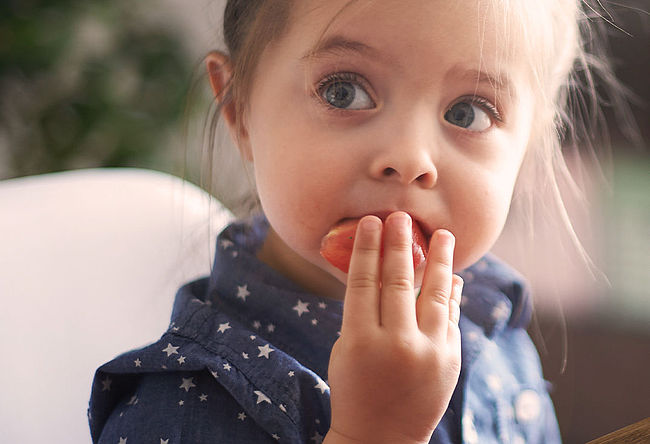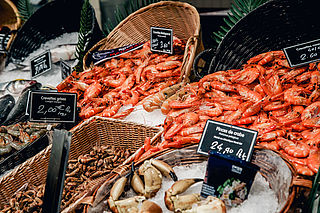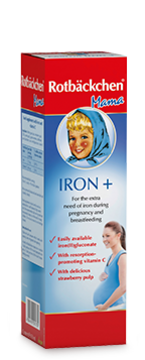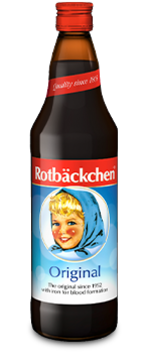Iodine
With Iodine, two key words come to mind: thyroid and salt. What is this all about? All information about iodine can be found here.
Table of Contents:
What is iodine?
Iodine is a trace element your body needs but cannot produce itself. Therefore, you need to get it through your diet.
In nature, iodine occurs in many ways, often found in soil and stones. Gradually, it is washed out into the environment and appears in groundwater and the ocean;
eawater has a relatively high iodine content. Logically, iodine is absorbed by marine life, like fish, algae and sponges.
Iodine - Effects & tasks in the body
![[Translate to Englisch:] Mutter mit Kleinkindern würzt Salat mit Salz [Translate to Englisch:] Mutter mit Kleinkindern würzt Salat mit Salz](https://www.rotbaeckchen.de/fileadmin/_processed_/1/8/csm_rotbaeckchen-jod-01_6657cf8fdc.jpg)
Iodine helps your body produce thyroid hormones normally and helps the thyroid gland itself to function properly. Moreover, iodine supports normal cognitive functions and energy metabolism. Iodine also supports the nervous system and even the skin. Just like a daily intake of vitamins, a regular supply of iodine is important for the young and old alike. In children, iodine supports healthy growth, which is why pregnant women should consume enough of this mineral. But what about this protection from radioactivity we keep hearing about? Here, radioactive iodine is produced in nuclear power plants during nuclear fission. For the body, this type of iodine is indistinguishable from natural iodine. Should an accident happen, and radioactive iodine escaped from a nuclear facility, the thyroid gland would also store radioactive iodine. The best prevention is to make sure one’s iodine stores are already filled – the so-called “iodine blockade”.
Average daily iodine requirement
The German Society for Nutrition has set a value of 200 µg iodine per day for youth and adults aged between 15 and 50. After 50, the value is slightly reduced. Outside of these ages or in special cases, like pregnancy and breastfeeding, other guideline values apply:
| Age | Iodine µg/day |
|---|---|
| Children between 1 and 4 years | 100 µg |
| Children between 4 and 7 years | 120 µg |
| Children between 7 and 10 years | 140 µg |
| Children between 10 and 13 years | 180 µg |
| Children between 13 and 15 years | 200 µg |
| Youth and adults between 15 and 51 years | 200 µg |
| Adults 51 years and above | 180 µg |
| Pregnant women | 230 µg |
| Breastfeeding women | 260 µg |
Increased iodine requirement
Pregnant and breastfeeding women have a higher requirement for iodine because it supplies their baby with nutrients via the umbilical cord or breast milk. Iodine is very important for babies and toddlers because it supports normal growth.
Foods containing iodine
![[Translate to Englisch:] Salzstreuer [Translate to Englisch:] Verstreuter Salz Behälter](https://www.rotbaeckchen.de/fileadmin/_processed_/0/f/csm_rotbaeckchen-jod-03_e4b69f80cc.jpg)
To ensure a normal iodine supply, you must consume enough food containing iodine. Seafood and fish are nature’s main iodine sources. According to the DGE (German Society for Nutrition), you should eat fish at least once a week. By the way, freshwater fish also contain iodine, although not as much as their saltwater relatives. Only some types of algae and seaweed are even more iodine rich. In some countries’ kitchens, including algae and seaweed on the menu is normal, like in
Japan or France. For example, brown algae is often used for seasoning. In Germany, water plants are an unusual part of sushi.
Iodised table salt is also an easy form of iodine absorption, being cheap and widely available at supermarkets. Iodised salt contains only enough iodine to be safe in case of hyperthyroidism.
| Food | Iodine per 100 g |
|---|---|
| Mullet | 330 µg |
| Cod | 229 µg |
| Blue mussel | 150 µg |
| Haddock | 135 µg |
| Tuna | 50 µg |
| Broccoli | 15 µg |
| Roasted peanuts | 13 µg |
| Spinach | 12 µg |
| Black tea | 11 µg |
| Eggs | 9,4 µg |
| Whole milk | 2,7 µg |
Average values according to Souci, Fachmann, Kraut: Food Composition and Nutrition Tables (7th ed.). Munich: C.H. Beck. 2008
Tips & useful information
Natural iodine in drinking water mainly comes from the soil. However, in Germany, this trace element only occurs in very small amounts in the soil; food in Germany also only contains a very small amount of iodine.
This is why foods like salt are artificially enriched with iodine. Iodine is also added to animal feed in farms to increase the public iodine intake through meat.
For now, Germany has a good Iodine supply. However, since there is very little iodine in fruit and vegetables, vegetarians and vegans need to pay careful attention to their supplies.
More about vitamins & nutrients

Vitamins & minerals
Want to know what all the valuable micronutrients do, what foods have them and how much you need? Find more information here.
Find out more
Iron
Iron is one of the most important trace elements in the body. It helps red blood-cell formation and is essential for transporting oxygen through the body. The right iron balance helps you and your family stay healthy.
Find out more
Vitamin B
The different members of the vitamin B complex perform different tasks – they take care of energy balance, the nervous system and many other processes in the body.
Find out more



![[Translate to Englisch:] [Translate to Englisch:]](https://www.rotbaeckchen.de/fileadmin/_processed_/0/7/csm_stillsaft-rotbaeckchen-145x360px_16cf2afe50.png)